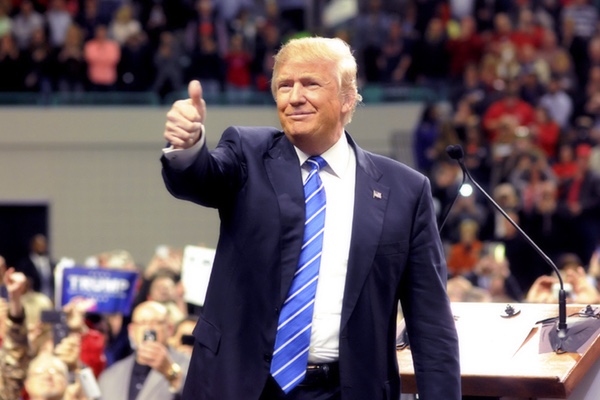Donald Trump Has a Chance of Winning – And History Shows Why

For the last year, whether we were talking about the shrinking field of opponents, the early primaries and caucuses, or the people opposing him and his mercurial personality, the mantra about Donald Trump has always been the same: he can do well under the current circumstances but when circumstances change, he will finally be gone. Just wait. And now, despite everything, Donald Trump, with no political experience and a personality so unlike typical Presidents, has won the right to become the presumptive Republican Presidential nominee.
Now we need to think about the heretofore seemingly impossible outcome: a President Trump. How could that ever happen? Everyone knows that he has problems with several important groups in the American population, especially minorities and women. And the odds are that he probably won’t win.
Yet, in recent Rasmussen polls, Trump has drawn even or with a small lead over Clinton. Clearly it could happen but why? The answer involves looking at a series of factors, singularly or together, that could give the Presidency to Donald Trump.
First of all, we are focusing too much on Trump and not enough on his likely opponent Hillary Clinton. For someone as famous as Hillary Clinton, it is remarkable how weak she is in the latest polls. A recent Real Clear Politics summary of polls showed that only 38% of Americans are favorably disposed towards her and a massive 55% are unfavorably disposed. While Trump’s rating are even worse, it is stunning to see a front runner for the Democratic Party’s nomination, one so well known, so much disliked.
Furthermore, there is a possibility, though we can’t put a number on it, that she might yet become embroiled in grave difficulty with the email issue or the Clinton Foundation issue. Either might sink her path to the White House.
Too, her opponent, Bernie Sanders, who was a relative unknown and avowed socialist, has won 17 primaries and caucuses, often by huge margins. Too, she now will have Bernie Sanders pushing her hard to the left all the way until the convention and even at the convention. Polls also show that 30% of Sanders’ supporters say that if he loses, they will not vote for Clinton.
Then there are the broad strokes of history. They show that repeatedly Americans, especially after two terms of one party, are apt to vote for the other party. Think of the post-war era. There we see the following design:
Democrat Harry Truman (1945-1953)
Republican Dwight Eisenhower (1953-1961)
Democrats John Kennedy (1961-1963) (assassinated) and Lyndon Johnson (1961-1969)
Republicans Richard Nixon (1969-1974) (resigned) and Gerald Ford (1973-1977)
Democrat Jimmy Carter (1977-1981)
Republican Ronald Reagan (1981-1989)
Republican George H.W. Bush (1989-1993)
Democrat Bill Clinton (1993-2001)
Republican George Bush (2001-2009)
Democrat Barak Obama (2009-2017)
Thus, with the sole exception of Bush 41, six of seven times there was a turnover after two terms from one party to the other. This is reinforced by another Rasmussen poll that shows 29% of the American people are satisfied with the direction of the country and 65% are dissatisfied. Similarly, with the slowest recovery from a major recession since the 1930s Great Depression, there is major dissatisfaction with the .5% GDP growth rate in the first quarter of this year leading to yet another year of growth under the long range annual average of 3% a year.
And finally, there are the personality imponderables. Donald Trump has several children--Ivanka, Eric and Donald--and one son-in-law in particular in Jared who could play significant roles in moving Donald to the center politically and improving his chances of victory.
So much of history is filled with imponderables that no one ever saw possible. In American politics since World War II who ever thought that a failed haberdasher named Harry Truman would someday be president of the United States? Who thought that Ronald Reagan, seen as too far to the right, could yet be elected a president for two terms? And, while it seems unlikely, there are a number of reasons that the impossible might just become possible--and on January 20, 2017 Donald Trump might yet take the oath to become our new American President.